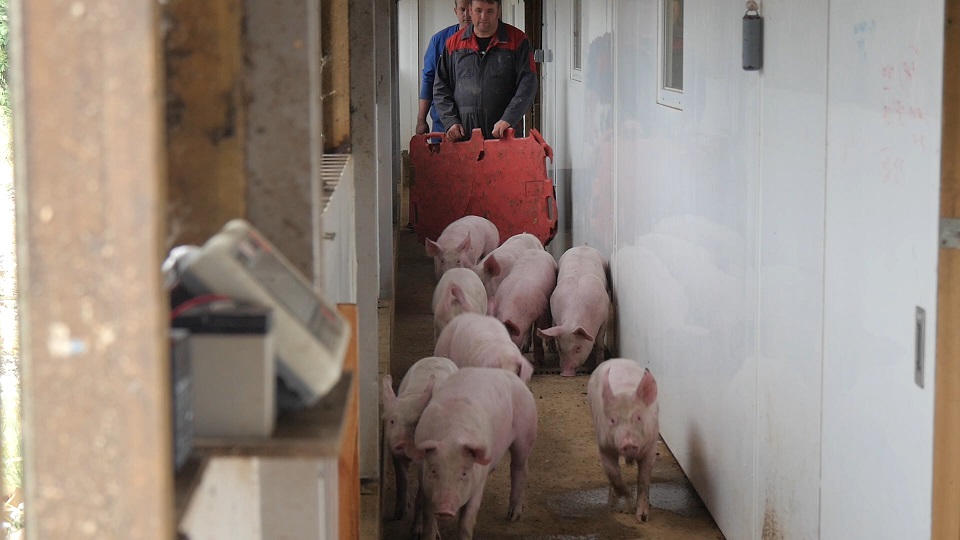Shining a spotlight on moving and handling
Thursday, 10 December 2020
Moving and handling pigs correctly is the right thing to do. Not only does it improve pig welfare and performance, but it also affects conception and carcase quality. Additionally, and importantly, it affects stockperson well-being and the way consumers view our trusted producers and industry.
Being skilled in this area also increases job satisfaction and reduces the time taken to carry out routine tasks. Clearly, correct handling makes sense, yet instances of poor handling still crop up.
We have been working closely with key stakeholders, including the National Pig Association (NPA), Red Tractor and the Pig Veterinary Society, to collate resources and guidance to help producers and stockpeople review and refresh the way they move and handle pigs.
What should we be doing?
The standards of welfare in the UK are underpinned by the Five Freedoms, as defined by the Animal Welfare Committee (AWC) and defined in the Code of practice for the welfare of pigs.
Both Red Tractor and RSPCA standards include requirements for stockpeople around skills, training and proficiency in handling and moving animals with care.
Dr Georgina Crayford, Red Tractor Technical Manager for Pigs, said: “All staff must be competent and staff performance must be reviewed regularly. Are producers fully aware of how their staff are doing tasks on a daily basis? Pigs need to be handled with care every single day, regardless of whether someone is watching, and regular observation of stockpeople is a simple way to be confident that things are as they should be.”
Failure to adhere to standards will, and does, result in consequences. Dr Crayford continued: “In a worst-case scenario of abuse and very poor handling, we would withdraw a producer’s Red Tractor certificate; this has a massive impact on a business. Food carrying the Red Tractor logo indicates it is safe, traceable and farmed with care; where standards slip, we have to take action. Where there is clear abuse, that is a legal issue and the industry would not, and should not, defend this.”
Red Tractor is seeking to facilitate uptake of new AHDB online training in pig handling by pig producers through introducing a new requirement in its pig standards. They are consulting on the proposed new standard and other changes throughout December 2020 and January 2021.
View the Five Freedoms in Defra's Code of practice for the welfare of pigs
The producer’s perspective
Good stockpeople will know and adhere to best practice when it comes to moving and handling the pigs they care for. It is common sense to handle pigs quietly and firmly, avoiding unnecessary stress, but working with animals isn’t always straightforward.
Dr Zoe Davies, Chief Executive of the NPA, explained: “We all know that pigs can be difficult to move and things don’t always go to plan.
“You aren’t always moving them in the best conditions – when you’re loading them at 4am in the pitch black, it can become stressful. This in turn can have a big impact on the process.”
Dr Davies advised: “When things get stressful, secure the pigs and take some time out to have a breather for five minutes and come back to it. It’s not worth undoing all the good work you have already done by pressing on.”
She continued: “It is important that everyone knows what is and what isn’t acceptable any more – some things that might have been deemed appropriate in the past might not be now, and it is critical to make sure everyone in the team understands what is and isn’t allowed.
“We need to make sure we do things in the right way, for the benefit of the pigs, the stockpeople and to enable us to sell our product to consumers, who might not understand farming and production as well as people working on farms think they do.”
Dr Davies added: “People will be watching you – just because you are in the middle of nowhere doesn’t mean you’re safe from prying eyes and that people won’t come and find you.”

The retail perspective
Animal welfare is important to consumers. The public expect retailers to have been thorough and made sure the products they are selling have been farmed responsibly and the animals treated with care and respect throughout the chain. Consumers, and therefore retailers, also expect a consistent product, which isn’t displaying signs that the animal was stressed during production or loading, for example through pale, soft, exudative (PSE) or dark, firm and dry (DFD) meat.
Speaking about this topic, Sophie Throup, Head of Agriculture at Morrisons, said: “Supporting British farmers is consistently one of the top three priorities of Morrisons’ customers, and we want to be able to remain proud of the great activity which goes on in our industry.
“The materials that AHDB has gathered together are really helpful, with some very good practical advice. I would encourage everybody to look at these materials and take time to assess what they are doing – there’s always something to learn or be reminded of.”
Caroline Mason, Head of Agriculture at Co-op, commented: “It’s such an important topic and great to see all parts of the supply chain pulling together to raise awareness and to support the need for continued personal development and training.”
Support and resources are available
We have developed a web page to provide you with an in-depth understanding of why pigs behave in certain ways, how they respond to humans and how to handle them effectively. It includes videos demonstrating best practice and links to additional helpful information and resources.
Visit our moving and handling page
Mandy Nevel, Head of Animal Welfare, said: “Good handling of pigs is critical for everyone in the supply chain and I encourage people to take the time to look at our website and watch the practical videos we share.
“And, remember, maintaining high standards not only improves pig welfare, but it also affects performance, carcase quality and staff morale.”

